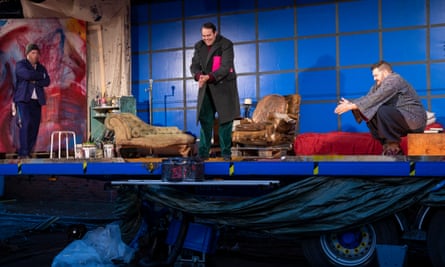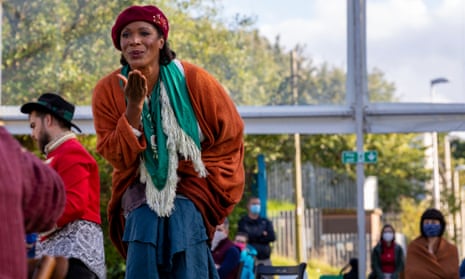In these Covid-tainted times when concert halls and opera houses are closed to audiences and companies struggle to survive, Scottish Opera’s new production of La Bohème stands as a beacon of light in the darkness. The company has successfully created a staging that adheres to stringent social distancing rules in front of a live audience and captures the spirit and colour of Puccini’s opera.
Staged in the parking lot of Scottish Opera’s Glasgow workshops – a bold proposition given the vagaries of autumnal Scottish weather – Roxana Haines’s production weaves in and around the audience. The artists’ garret is a shipping container at the side of the open-sided marquee, the centre of which turns into Café Momus in the second act. Thus the spectators seated at bistro tables become part of the crowd witnessing the ruckus as Rhian Lois’s delightfully vixenish Musetta torments poor Alcindoro (Francis Church), the dupe who is left holding the bar bill.

It could be inventive student opera on a shoestring, albeit with a superlative cast. With her velvet-hued voice, Elizabeth Llewellyn is a dignified Mimì, seemingly more worldly-wise than Samuel Sakker’s youthfully impassioned Rodolfo. Roland Wood (Marcello), David Ireland (Colline) and Arthur Bruce (Schaunard) have lots of fun as his down-at-heel bohemian flatmates but bring the right note of sensitivity to the closing scene. From inside the warehouse, conductor Stuart Stratford and the orchestra of Scottish Opera keep the action moving. The company has sensibly chosen to perform the opera in the abridged, chamber version by composer Jonathan Dove, keeping the action to 90 minutes without an interval. Amanda Holden’s witty translation (updated with a few Covid references) adds to the immediacy of the piece.
It isn’t perfect. The amplification, although fairly sensitive, is at times kinder to the singers than it is to the orchestra, and I could have done without the interpretative dance, although movement director/dancer Jessica Rhodes’s role in the closing moments was truly moving. Taken as a whole, however, the result must stand as a true triumph of artistic endeavour over adversity and a great morale boost in difficult times.

Comments (…)
Sign in or create your Guardian account to join the discussion